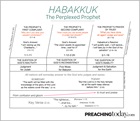Your Soul
Article
An Examen for Preachers

“I want to do the original work of being in deepening conversation with the God who reveals himself to me and addresses me by name. I don’t want to dispense [copied] hand-outs that describe God’s business; I want to witness out of my own experience. . . . I need reflective hours over the pages of Scripture as well as personal struggles with the meaning of Scripture. That takes far more time than it takes to prepare a sermon.”
Eugene Peterson, The Contemplative Pastor (pgs. 19-20)
We’ve been trained in sermon preparation. We can open a few tabs on our computers and have an outline ready to go in no time. But what if before we can get to the stage of the sermon being written by us, the sermon needs to be written in us? What if all of life is sermon prep?
Of course we bring our training and experience to this calling—skills of studying Scripture and commentaries, of organizing ideas, of honing language and presenting our thoughts, in engaging ways, to our congregations.
One of the skills we’re often less trained in is contemplation: the practice of listening, of watching, of waiting. This practice grows from the fundamental belief that there is a God already at work in and around us, in and through Scripture. I’ve not heard of many preaching classes that train preachers how to still themselves, trusting that the God who writes every sermon is the best resource to turn to before all the other sources we more readily access.
We’d say that God is ultimately the One at work in our people, through Scripture, that he is the One responsible for leadership of this place. But does our sermon preparation express that belief?
The Examen
In my personal faith I’ve found my capacity for listening and trusting has been greatly deepened by the Ignatian practice of Examen. So I’ve adapted this practice for use in my weekly work of sermon preparation. The Examen is an ancient practice which is often done daily to help us reflect and notice God’s hand at work in our lives.[1]
I’ve created an examen especially for preachers to help us pay attention to how the Spirit has been shaping us through Scripture, how God has already been working in our lives the lessons he wants us to share in our sermons. If we want our congregations to take our words to heart and apply them in their lives, what better place to test these lessons than in our own hearts and lives?
The following provides prompts for reflection which may be helpful for a journaling exercise. Alternatively, I’ve made a simple video if you’d rather be led through it without having to read.
Find a place where you can settle quietly for a few moments without interruption.
Find a time when you can give at least 15 minutes to this process. Don’t rush any of it.
An Examen for Preachers
Become aware of the sounds around you. What sounds are closest to you? What sounds are further away?
Feel the fabric of your clothing on your skin. Is it rough or soft? Tight or loose?
Breathe deeply. Fill your lungs with good, pure air.
Slowly breathe in. And slowly out.
And again—breathe in slowly, breathe out slowly.
What a gift to have lungs and to have air to fill them!
Become aware of the place where you are sitting, the chair or floor beneath you that is willing to take your weight. Feel your weight pressing into whatever is beneath you. It feels good to be held like that.
Become aware of your feet. Place them on the ground if you can. Feel the weight of your feet, allowing the ground to hold them. Feel how solid the ground is under your feet. It feels good to let your feet just be held by the ground. Visualize the floor or the ground beneath your feet and what is under it and what is under that.
Become aware of your presence in this body, in this room. God has placed your spirit in this body. God has placed your body in this place, in this moment, on this day. Breathe and receive the gift of this life and this presence here.
Find a posture that helps you become aware of God’s presence.
You are not making God close, you are simply turning your attention to the possibility that God has been with you all day, all week. Whether or not you have been conscious of God. Whether or not you feel God’s presence, God is here.
Above you and beneath you.
Before you and behind you.
God’s presence is not only with you but within you.
The same Spirit which spoke creation into existence is in you.
The same Spirit that rose up Jesus from the dead is in you.
Breathe and receive that presence.
How have you been watching God at work in Scripture?
In nature?
In your life?
In your relationships?
Your experiences don’t have to be pleasant. Include the places where you’re confused or angry, the things you don’t like or understand, the Bible passages that make you uncomfortable. Maybe there have been ways the Spirit has been at work in your life this week which has been more of an undercurrent than a conscious experience. Invite the Lord to bring these to the surface of your mind.
Are there songs that have caught your ear this week?
Or Bible passages? Has your heart been drawn in by lines from movies or the news? Have you had snippets from conversations which have stayed with you?
Take note of them. You don’t have to understand their relevance. If they seem significant or have resonated in you in some way, just note them.
Where have you had strong feelings this week? How might God want you to pay attention to those emotions, both what you’d call positive and negative emotions?
Where have you been troubled or saddened this week?
Where have you been angry or indignant this week?
Where have you felt lightness or hope this week?
What has made you laugh or smile this week?
Where has there been darkness?
What has kept you awake this week?
Take note of trends in your emotional experiences.
As you look back on what’s coming to the surface, are there themes in how God has been working in your life this week? How have you seen themes in the way God’s been working in your church community this week?
Take note of these themes now.
What stirs in you as you pray about the sermon? Whose faces come to mind? What memories come to the surface? What hopes and fears are at work in you?
What is your response to the Bible passage for this sermon? Do you find comfort or delight in this passage? Does the passage confuse or intimidate or unsettle you? What questions come to mind as you read the passage?
Take note of all this.
As you look back on what you’ve noted about how God is working in your life, in the Bible, in your community, do you see any new connections?
Invite God to show you what lessons are for your own growth and how your life is a testing ground for lessons to be shared in your sermons.
What is God saying to you and what does God want to say through you?
Invite God to use your life to bring good news this week
Trust that God knows you, and God knows your audience.
Trust that God wants to speak in you and to you and through you and because of you and even in spite of you.
Trust that God is the ultimately author of your life and of your sermons.
Trust that God has put you—this body, this voice, these gifts, this story—in this place to express his truth to these people.
My Experience Implementing the Examen
Before I used this examen, sermon writing felt like a task and one that had an audience and a deadline which turned me inwards. Will I have something to say? Can I get this done in time? Will it be any good? It was a surprisingly secular way of writing something that’s supposed to be very spiritual. It grew from the assumption that the work of sermon writing begins when I begin writing a sermon. In theory I would say that God is the One who writes every sermon, the One who guides my life and the life of this congregation. So I asked myself, “If I really believed that, how would I prepare a sermon?” That question led me to these practices which help me remember my belief that our work is not the work of beginning something but of joining with what God’s already doing.
We have been taught by our culture and education that to do well at something means to take on full responsibility. So it was scary to start the important work of sermon writing by stepping back from productivity—Will this be a waste of time? Nothing comes from doing nothing! But when we’re paying attention to God, although we may be still and quiet for a time, we’re doing something very powerful. We’re tapping into the source of all goodness and life and trusting that it has something to say to us and through us. This practice has made my sermons more engaging, more fresh. It’s made me more free as a preacher. And I pray that a sermon shaped from watching God’s extraordinary work in my ordinary life will naturally find a place to land in other ordinary lives.

I made this collage to express my experience of preparing sermons. The color squeezed from the tubes of paint is messy but it’s beginning to take shape into something that makes sense. The process of preparing a sermon can feel like this, as we trust that the confusing ways we watch God at work in our own lives can be honed into something to bless others in their walk with the same God we follow.
[1] more here: https://www.ignatianspirituality.com/ignatian-prayer/the-examen/
Mandy Smith is the pastor of St Lucia Uniting Church in Brisbane, Australia, and author of The Vulnerable Pastor: How Human Limitations Empower Our Ministry and Unfettered: Imagining a Childlike Faith Beyond the Baggage of Western Culture. Her latest book, Confessions of an Amateur Saint: The Christian Leader's Journey from Self-Sufficiency to Reliance on God, releases in October 2024. Mandy teaches for The Eugene Peterson Center for Christian Imagination and Fuller Seminary. Learn more at www.TheWayIsTheWay.org.










